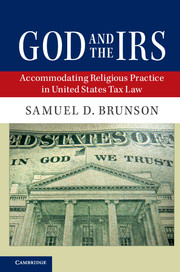Book contents
- God and the IRS
- God and the IRS
- Copyright page
- Dedication
- Contents
- Acknowledgments
- Introduction
- 1 Religion and the State
- 2 On Making the Tax Law
- 3 Accommodation in the Intersection of Religious Practice and the Tax Law
- 4 Taxing Citizens of the Kingdom of God
- 5 Housing Clergy
- 6 Neither a Borrower nor a Lender Be
- 7 Deductible Contribution or Purchase of Religious Benefit?
- 8 A Right to Tithe?
- 9 Without Purse, Scrip, or Taxes
- 10 Religious Communitarians
- 11 A Framework for Religious Tax Accommodation
- Notes
- Index
9 - Without Purse, Scrip, or Taxes
Published online by Cambridge University Press: 12 April 2018
- God and the IRS
- God and the IRS
- Copyright page
- Dedication
- Contents
- Acknowledgments
- Introduction
- 1 Religion and the State
- 2 On Making the Tax Law
- 3 Accommodation in the Intersection of Religious Practice and the Tax Law
- 4 Taxing Citizens of the Kingdom of God
- 5 Housing Clergy
- 6 Neither a Borrower nor a Lender Be
- 7 Deductible Contribution or Purchase of Religious Benefit?
- 8 A Right to Tithe?
- 9 Without Purse, Scrip, or Taxes
- 10 Religious Communitarians
- 11 A Framework for Religious Tax Accommodation
- Notes
- Index
Summary
- Type
- Chapter
- Information
- God and the IRSAccommodating Religious Practice in United States Tax Law, pp. 147 - 168Publisher: Cambridge University PressPrint publication year: 2018

